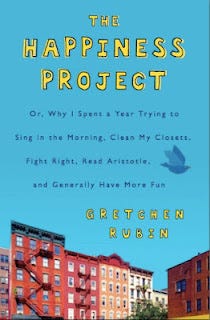The Happiness Project
[I don't usually write such long book reviews, but this one got me thinking a lot! It was a great book club discussion book too since it seemed to inspire personal action and application from all of us, in one way or another.]

The Happiness Project is one of those one-year experiment books; in this one, the author, Gretchen Rubin, starts with a moment in which she wonders if she's really happy, or if she's just letting life pass by - and it spurs her year-long project of research and resolutions to build happiness. She keeps a resolution chart to stay on track and have a constant reminder of her goals, and she chooses a different category to work on each month, such as marriage, parenthood, money, leisure, work, attitude, and pursuing a passion.
Some of the tasks she works on each month are fairly simple and practical - "go to sleep earlier" in the vitality month, "remember birthdays" in the friendship month, "keep a gratitude journal" in the eternity month - and others are more lofty goals or real attempts at behavioral change - "quit nagging" in the marriage month, "don't gossip" in the friendship month, "stimulate the mind in new ways" in the mindfulness month. The resolutions are partly dos (doing things that she enjoys, broadening her horizons) and partly don'ts (stopping doing things that make her feel bad like nagging or criticizing), leading to her main definition/truth of happiness: "To be happier, you have to think about feeling good, feeling bad, and feeling right, in an atmosphere of growth."
And for her, it works. There are pitfalls along the way, but overall, through the tasks and the resolutions, she feels happier (of course, she doesn't have any scientific measure of this, but as Rubin says, it doesn't really matter: in part, you're happy if you think you're happy).
Throughout her project, Rubin comes up with her "Four Splendid Truths" that define happiness as well as commandments to help guide any resolution or task she undertakes on her way to happiness (so they also help her decide which resolutions will build her version of happiness). I think this was one of the great takeaways from this book - everyone's happiness project will look different, but these maxims or truths can help lead the way for everyone: "the days are long, but the years are short"; "act the way I want to feel", "enjoy the process," "be Gretchen" (i.e. "be yourself").
It might seem a little odd to put so much work into happiness - if it's such a task to achieve, is one really happy? But it turns out there are many paradoxes when it comes to happiness. As Rubin describes, the things that sometimes bring the most frustration in your day can be your greatest source of happiness (i.e. kids), and the things that you really don't feel like doing (i.e. her January resolution of "tackle a nagging task") or the things that you find really challenging to achieve (i.e. her project of starting a blog) can give you great happiness through satisfaction of accomplishment. Happiness isn't just about comfort or cheer - it's partly about the atmosphere of growth and the long term.
And making yourself happy isn't as selfish as it sounds: I think working toward happiness is part of being stewards of the lives we've been given, and as Gretchen writes in her second truth, "one of the best ways to make yourself happy is to make other people happy; one of the best ways to make other people happy is to be happy yourself." Your being happy will contribute to others' happiness because you'll be kinder, have the energy to help where needed, and so on.
I'm not a huge fan of self-help books or just plain research-based non-fiction, so I wasn't sure how I'd feel about this one at first. But the research about happiness is presented in an interesting way, mixed with enough anecdotes about how the resolutions play out (sometimes successfully, sometimes not) in a real life to keep me interested. And since the book follows the project in chronological order by month, it had enough of a story trajectory to keep me moving through. And I really enjoyed it.
I can't stop thinking about the pieces that I could apply to my life or spouting little tidbits that I learned about the psychology or philosophy of happiness. Since I'm the type-a kind of person this author seems to be, the goals and resolutions and tasks and rules to live by totally appeal to me - so when I read this book, I felt like my life couldn't not change from it. I want to have what she talks about. So I'm currently thinking about what my resolutions will be, probably a mix of Gretchen's that I really liked along with some of my own. I've already been working on acting like I have energy to keep me going when I'm tired, tackling nagging tasks (take that, pesky retirement account management!), speaking with a positive twist, finding community.
All in all, a great book to read at the beginning of a new year, when one is apt to think about how time flies, (so make the best of it!).
p.s. if you want to learn more, obviously you can read the book, but you can also check out the Happiness Project blog.


